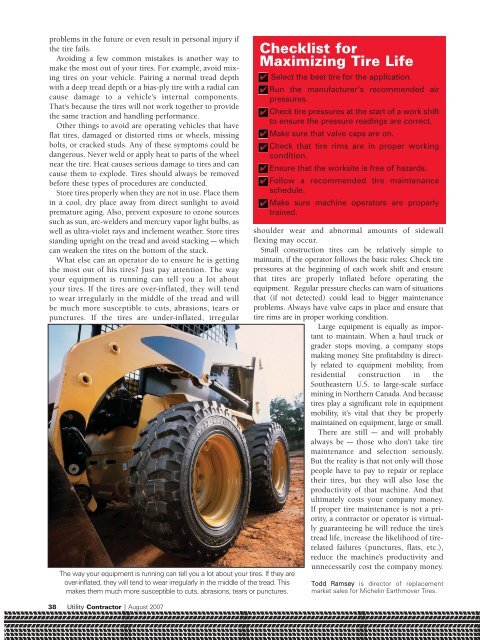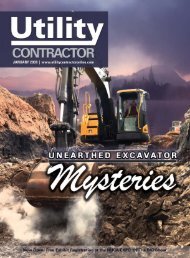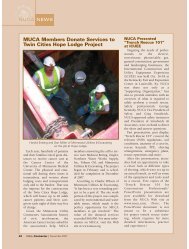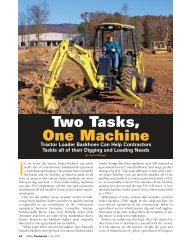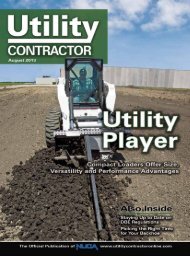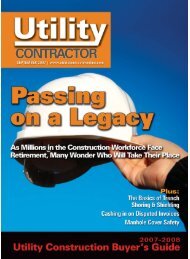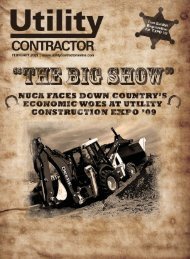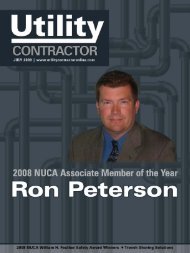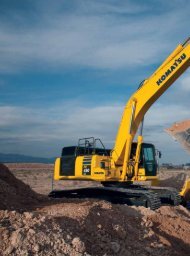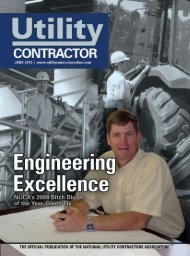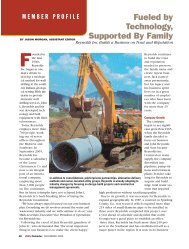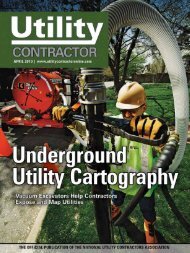View Full August PDF Issue - Utility Contractor Online
View Full August PDF Issue - Utility Contractor Online
View Full August PDF Issue - Utility Contractor Online
- No tags were found...
Create successful ePaper yourself
Turn your PDF publications into a flip-book with our unique Google optimized e-Paper software.
problems in the future or even result in personal injury ifthe tire fails.Avoiding a few common mistakes is another way tomake the most out of your tires. For example, avoid mixingtires on your vehicle. Pairing a normal tread depthwith a deep tread depth or a bias-ply tire with a radial cancause damage to a vehicle's internal components.That's because the tires will not work together to providethe same traction and handling performance.Other things to avoid are operating vehicles that haveflat tires, damaged or distorted rims or wheels, missingbolts, or cracked studs. Any of these symptoms could bedangerous. Never weld or apply heat to parts of the wheelnear the tire. Heat causes serious damage to tires and cancause them to explode. Tires should always be removedbefore these types of procedures are conducted.Store tires properly when they are not in use. Place themin a cool, dry place away from direct sunlight to avoidpremature aging. Also, prevent exposure to ozone sourcessuch as sun, arc-welders and mercury vapor light bulbs, aswell as ultra-violet rays and inclement weather. Store tiresstanding upright on the tread and avoid stacking — whichcan weaken the tires on the bottom of the stack.What else can an operator do to ensure he is gettingthe most out of his tires? Just pay attention. The wayyour equipment is running can tell you a lot aboutyour tires. If the tires are over-inflated, they will tendto wear irregularly in the middle of the tread and willbe much more susceptible to cuts, abrasions, tears orpunctures. If the tires are under-inflated, irregularThe way your equipment is running can tell you a lot about your tires. If they areover-inflated, they will tend to wear irregularly in the middle of the tread. Thismakes them much more susceptible to cuts, abrasions, tears or punctures.38 <strong>Utility</strong> <strong>Contractor</strong> | <strong>August</strong> 2007Checklist forMaximizing Tire LifeSelect the best tire for the application.Run the manufacturer’s recommended airpressures.Check tire pressures at the start of a work shiftto ensure the pressure readings are correct.Make sure that valve caps are on.Check that tire rims are in proper workingcondition.Ensure that the worksite is free of hazards.Follow a recommended tire maintenanceschedule.Make sure machine operators are properlytrained.shoulder wear and abnormal amounts of sidewallflexing may occur.Small construction tires can be relatively simple tomaintain, if the operator follows the basic rules: Check tirepressures at the beginning of each work shift and ensurethat tires are properly inflated before operating theequipment. Regular pressure checks can warn of situationsthat (if not detected) could lead to bigger maintenanceproblems. Always have valve caps in place and ensure thattire rims are in proper working condition.Large equipment is equally as importantto maintain. When a haul truck orgrader stops moving, a company stopsmaking money. Site profitability is directlyrelated to equipment mobility, fromresidential construction in theSoutheastern U.S. to large-scale surfacemining in Northern Canada. And becausetires play a significant role in equipmentmobility, it's vital that they be properlymaintained on equipment, large or small.There are still — and will probablyalways be — those who don’t take tiremaintenance and selection seriously.But the reality is that not only will thosepeople have to pay to repair or replacetheir tires, but they will also lose theproductivity of that machine. And thatultimately costs your company money.If proper tire maintenance is not a priority,a contractor or operator is virtuallyguaranteeing he will reduce the tire’stread life, increase the likelihood of tirerelatedfailures (punctures, flats, etc.),reduce the machine’s productivity andunnecessarily cost the company money.Todd Ramsey is director of replacementmarket sales for Michelin Earthmover Tires.


